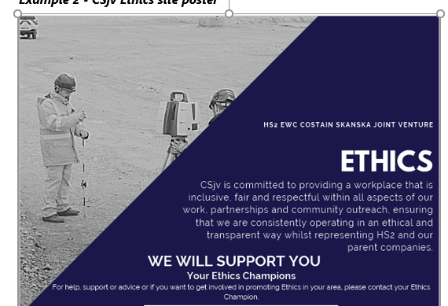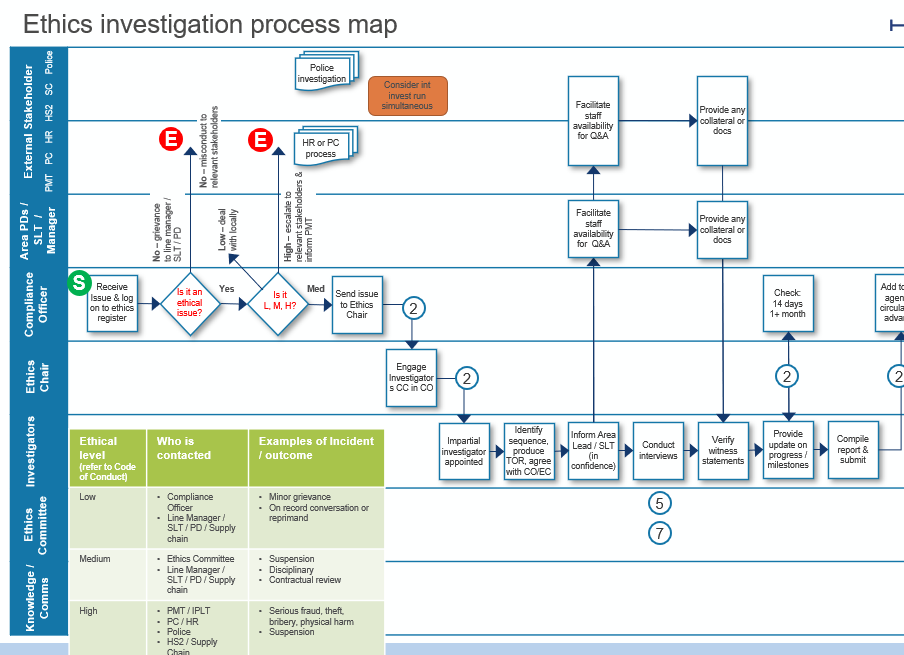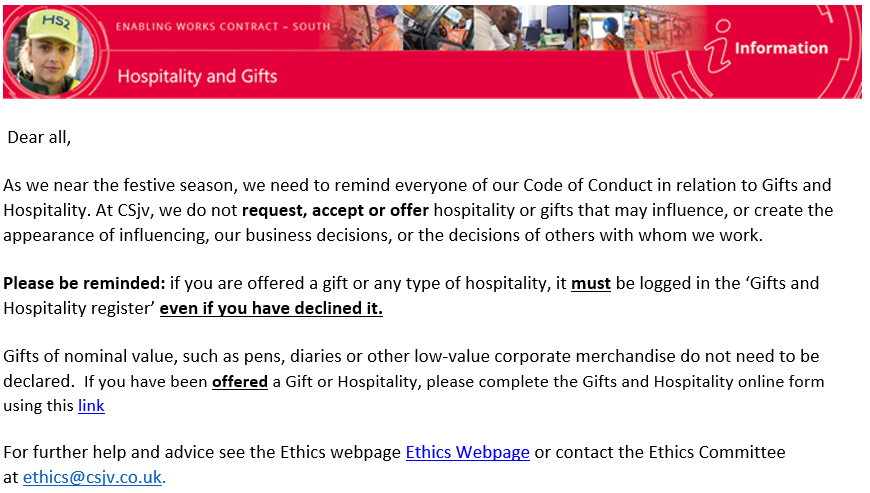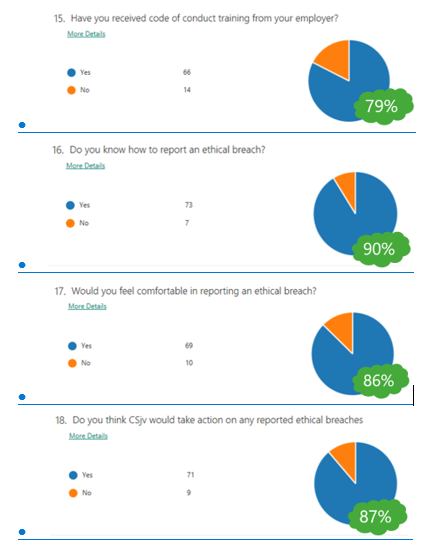Ethical Construction
Ethical concerns are traditionally managed by parent companies. In a joint venture, a lack of a common approach in capturing, investigating and analysing trends can lead to a fractured process. Costain Skanska joint venture (CSjv) and HS2 have worked together to deliver an ethics system to drive values and behaviours throughout the JV and suppliers.
An ethical committee was established to provide oversight of the policies and procedures, monitor the overall ethical health of the JV, reporting to the JV board. Ethics champions promoted ethics within the sites providing assistance and advice, supporting the inclusive and diverse workforce. These were supported by the development of common processes across the JV, a SharePoint site accessible to all and clear and regular communications. An annual Ethics Plan set out the focus for the coming year to deliver initiatives, maintain compliance and measure progress. Performance is monitored through culture surveys.
This learning legacy will be of use to newly formed joint venture organisations considering their combined approach to ethics.
Introduction and industry content
The Enabling Works Contract (EWC) on the southern section (Area South) is part of High Speed Two (HS2) phase one which includes demolition of buildings within the wider Euston area, utility diversions, environmental and ecological monitoring and a programme of historic environment and archaeological activities, delivered by the Costain Skansja joint venture (CSjv).
At the onset of the Costain Skanska joint venture (JV), the JV partners set out their shared values.

Encouraging the reporting of ethical concerns established an open and honest culture, demonstrated living our values, discouraged ethical breaches and aligns with HS2’s Safe at heart programme.
Although whistleblowing and the reporting of ethical concerns was encouraged, issues were being raised through a variety of routes; HS2 & Parent Company whistleblowing lines, HR departments and local managers.
There was no coherent method of notifying, recording, or investigating ethical issues which resulted in an inconsistency of approach and a lack of understanding of common issues.
In focussing on the JV value of “Do the Right Thing”, the Programme Director as Sponsor, formed the JV Ethics Committee (EC) comprising of key personnel across the programme, who demonstrated attributes of living our values.
The purpose of the Ethics Committee was to assist the JV Board with oversight of the policies and procedures, monitor the overall ethical health of the JV, embed the values, investigate potential breaches of policy and advise the JV Board with a view to identify and mitigate any risks
The JV Board, Leadership Team and Ethics Committee all support the drive to act ethically and transparently, live by the code of conduct, support HS2’s Safe at Hhart and never accept shortcuts.
The journey to embed Ethics
The priority of the JV was to set policy, enforce governance, and create a safe culture for ethical issues to be investigated. A programme of initiatives was put in place.
Ethics Framework

The ethics framework in Figure 1 set out an ambitious plan to establish an ethics committee to deliver initiatives, maintain compliance and measure progress.
Ethics committee
The Ethics Committee was made up of volunteers and personnel recommended for their integrity. Commitment from personnel who lived the JV values was instrumental in setting the foundations for success.
Attendance at meetings is measured to maintain a committee that is engaged with the process.
JV policies and procedures
Policies were written in line with both JV partners to merge common standards and agree adjustments to the highest standard where policy variants were identified.
Communication channels
Providing multiple communication channels enabled personnel to report issues in confidence. The channels of communication include an ethics mailbox, dedicated ethics phoneline manned on rota by the ethics committee and champions, an online form where personnel could report anonymously with a QR code for site based and supply chain personnel to access the online form from their devices.

Ethics webpage

A one stop shop was launched on the JV SharePoint site (figure 3) to provide an area which contains key contacts, policies, guidance, and training. A library of ethical dilemmas and lessons learnt are available for use in toolbox talks, start on site shift briefings and meetings.
Ethics champions
Ethics Champions were targeted as personnel associated to localised sites and offices across the programme that demonstrate ethical behaviours. They promote ethics within the sites providing assistance and advice, supporting our inclusive and diverse workforce. Communication is delivered across direct staff and suppliers, credit card sized Z cards are distributed to site personnel, to promote the raising and reporting of Ethical breaches (figure 4).

Publicising the Ethics Committee & Ethics Champions
Photographs and direct contact details of the ethics committee and champions on the ethics webpage demonstrates the support of ethics at the most senior level. Regular briefings and site posters promoting the committee and champions maintain the focus on ethics throughout the programme (see example in figure 5).

Training programmes
Delivery of bespoke training on the Code of Conduct and Bribery Act Training is carried out to ensure all personnel understand their responsibilities.
Culture surveys
Specific ethical questions are incorporated into culture surveys for office and site personnel. These can be modified to focus on any trends such as discrimination, bullying or fraud. Outputs contribute to targeted initiatives.
Measure, report, and target
Capturing ethical issues raised and outputs generated, provides analysis on common topics and trends. Evaluation of parent company or supply chain, category, work type, breach or non-breach and geographical location all give insight and drive initiatives for improvement.
Embedding just and fair processes
Carrying out just and fair investigations, preserving anonymity for whistleblowers and maintaining parity across the JV.

Ethics investigation process map
Lessons learned
Delivering moral and contractual requirements
- The HS2 family is required to be compliant with the projects works information relating to fraud and bribery and the Ethics Committee supports the JV Board in achieving this.
- The introduction of the ethics committee was driven by a desire to provide a catalyst to promote integrity across our workforce and supply chain. Supported by our code of conduct and creating a safe space to report wrongdoing in turn delivers value for money for HS2.
- All personnel across the programme are encouraged to speak out and do the right thing. Living our values, by respecting and maintaining confidentiality laid the foundations for an open and honest culture where the workforce could safely report any wrongdoing. A confidential register of issues raised is maintained with trends identified and change actioned.
- The ethics committee and ethics champions are recognised as having integrity and demonstrate living our values. Regular briefings, toolbox talks, and communications keep ethics at the heart of the programme. Monthly reminders to declare Gifts and Hospitality, ensures the register of interest is maintained.

Empowering the workforce
- The purpose of HS2’s Safe at heart – I care, You count, We matter – is to galvanise a common belief, vision, set of values and behaviours.
- Issues raised to the ethics committee include bullying, harassment, and discrimination. By creating a safe space and empowering people, additional benefits were realised in highlighting areas of concern in Heath, Safety & Wellness and Equality, Diversity & Inclusion.
- Investigating allegations and publishing anonymised lessons learnt and recommendations led to targeted campaigns addressing such issues as Banter, Respect and Modern-Day Slavery. This approach further promoted our values and encouraged personnel to speak out.
- The workforce of over 2,000 at its peak, was made up of a diverse group of individuals from different industries. Raising the bar in construction, typically a male dominated environment, and changing the culture and behaviours to reflect a more diverse workforce has been a genuine success. Empowering the workforce to speak out without retribution resulted in a greater understanding of others.
Maintaining focus
- An annual Ethics Plan sets out the focus for the coming year to deliver initiatives, maintain compliance and measure progress.

- Regular culture surveys maintain a finger on the pulse and captures the attitudes of the workforce on our values.

- The introduction of Ethics Champions and taking Ethics to site maintains focus on continuous improvement.
Recommendations
The creation of the CSjv Ethics Committee is recognised as being an exemplar model of openness and trust. The Ethics Committee model is being adopted by main works contractors in the South area and can also be emulated by contractors working for other projects.
Creating a network for all HS2 contractors to share best practice and bring lasting benefits to the construction industry would require top level sponsorship from all HS2 contractors.
The mechanics of setting up a network is simple and would deliver a cohesive message to the wider construction industry demonstrating a desire to raise the bar and be proud to make a difference in such a complex industry.
Acknowledgements
The author wishes to thank all those who have contributed to the successful implementation of the Ethics programme. These include:
- JV Programme Director – Peter Jones (sponsor and chair of the JV Ethics Committee)
- HS2 Fraud Investigator – Jorden Brewster
- JV Ethics Champions
- JV Ethics Committee
- JV Communications Team

